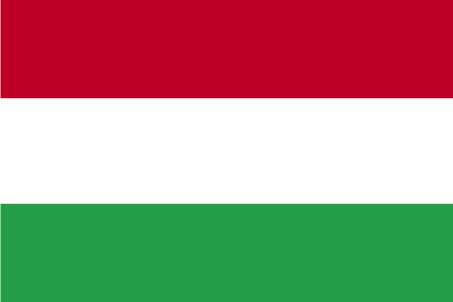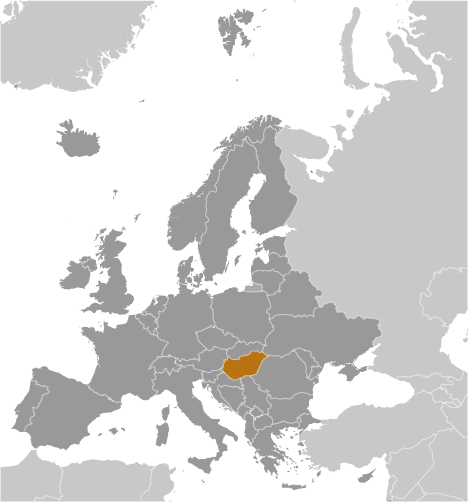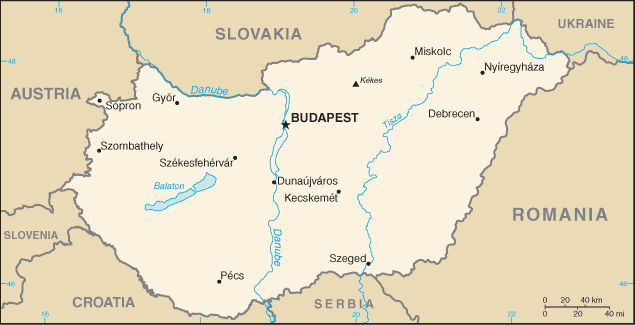|
Country name:
|

|
|
conventional long form: none
conventional short form:
Hungary
local long form:
none
local short form:
Magyarorszag
|
|
|
Government type:
|

|
|
parliamentary democracy
|
|
|
Capital:
|

|
|
name: Budapest
geographic coordinates:
47 30 N, 19 05 E
time difference:
UTC+1 (6 hours ahead of Washington, DC during Standard Time)
daylight saving time:
+1hr, begins last Sunday in March; ends last Sunday in October
|
|
|
Administrative divisions:
|

|
|
19 counties (megyek, singular - megye), 23 urban counties (singular - megyei varos), and 1 capital city (fovaros)
counties:
Bacs-Kiskun, Baranya, Bekes, Borsod-Abauj-Zemplen, Csongrad, Fejer, Gyor-Moson-Sopron, Hajdu-Bihar, Heves, Jasz-Nagykun-Szolnok, Komarom-Esztergom, Nograd, Pest, Somogy, Szabolcs-Szatmar-Bereg, Tolna, Vas, Veszprem, Zala
urban counties:
Bekescsaba, Debrecen, Dunaujvaros, Eger, Erd, Gyor, Hodmezovasarhely, Kaposvar, Kecskemet, Miskolc, Nagykanizsa, Nyiregyhaza, Pecs, Salgotarjan, Sopron, Szeged, Szekesfehervar, Szekszard, Szolnok, Szombathely, Tatabanya, Veszprem, Zalaegerszeg
capital city:
Budapest
|
|
|
Independence:
|

|
|
16 November 1918 (republic proclaimed); notable earlier dates: 25 December 1000 (crowning of King STEPHEN I, traditional founding date); 30 March 1867 (Austro-Hungarian dual monarchy established)
|
|
|
National holiday:
|

|
|
Saint Stephen's Day, 20 August; note - commemorates the date when his remains were transferred to Buda (now Budapest)
|
|
|
Constitution:
|

|
|
25 April 2011, effective 1 January 2012
|
|
|
Legal system:
|

|
|
civil legal system influenced by the German model
|
|
|
International law organization participation:
|

|
|
accepts compulsory ICJ jurisdiction with reservations; accepts ICCt jurisdiction
|
|
|
Suffrage:
|

|
|
18 years of age, 16 if married; universal
|
|
|
Executive branch:
|

|
|
chief of state: Janos ADER (since 10 May 2012)
head of government:
Prime Minister Viktor ORBAN (since 29 May 2010)
cabinet:
Cabinet of Ministers prime minister elected by the National Assembly on the recommendation of the president; other ministers proposed by the prime minister and appointed and relieved of their duties by the president
(For more information visit the World Leaders website  ) )
elections:
president elected by the National Assembly for a five-year term (eligible for a second term); election last held on 2 May 2012 (next to be held by May 2017); prime minister elected by the National Assembly on the recommendation of the president; election last held 29 May 2010
election results:
Janos ADER elected president; National Assembly vote - 262 to 40; Viktor ORBAN elected prime minister; National Assembly vote - 261 to 107
note:
to be elected, the president must win two-thirds of legislative vote in the first round or a simple majority in the second round
|
|
|
Legislative branch:
|

|
|
unicameral National Assembly or Orszaggyules (386 seats; members elected by popular vote under a system of proportional and direct representation to serve four-year terms)
elections:
last held on 11 and 25 April 2010 (next to be held in spring 2014)
election results:
percent of vote by party (5% or more of the vote required for parliamentary representation in the first round) - Fidesz-KNDP 52.7%, MSZP 19.3%, Jobbik 16.7%, LMP 7.5%; seats by party - Fidesz-KNDP 263, MSZP 59, Jobbik 47, LMP 16, independent 1
note:
current composition - seats by party - Fidesz 226, MSZP 48, Jobbik 43, KNDP 37, Democratic Coalition 10, Dialog for Hungary 8, LMP 7, independent 7
|
|
|
Judicial branch:
|

|
|
Constitutional Court (judges are elected by the National Assembly for nine-year terms); Curia (highest court; head of Curia elected by National Assembly, the other judges elected by the president on recommendation of the head of the National Office of the Courts, a separate administrative body); Regional Courts of Appeal (judges are appointed by the president)
|
|
|
Political parties and leaders:
|

|
|
Christian Democratic People's Party or KDNP [Zsolt SEMJEN]; Democratic Coalition [Ferenc GYURCSANY]; Dialogue for Hungary [Benedek JAVOR, Timea SZABO, co-chairs]; Fidesz-Hungarian Civic Alliance or Fidesz [Viktor ORBAN, chairman]; Hungarian Socialist Party or MSZP [Attila MESTERHAZY]; Movement for a Better Hungary or Jobbik [Gabor VONA]; Politics Can Be Different or LMP [13-member leadership; some positions currently vacant]
|
|
|
Political pressure groups and leaders:
|

|
|
Air Work Group (works to reduce air pollution in towns and cities); Danube Circle (protests the building of the Gabchikovo-Nagymaros dam); Fourth Republic (Negyedik Koztarsasag) or 4K! (anti-Orban, pro-democracy Facebook movement emerged from a Facebook group, One Million for Freedom of the Press or "Milla," and plans to form a leftist political party); Green Future (protests the impact of lead contamination of local factory on health of the people); Hungarian Civil Liberties Union (Tarsasag a Szabadsagjogokert) or TASZ (freedom of expression, information privacy); Hungarian Helsinki Committee (asylum seekers' rights, human rights in law enforcement and the judicial system); Szolidaritas ("Solidarity," formed in October 2011 by three trade unions and an NGO - anti-Orban government); "Egyutt 2014" ("Together 2014," a political electoral alliance bringing together Milla, Szolidaritas, and "Haza es Haladas," an association headed by former PM Gordon BAJNAI, to contest Fidesz and Viktor ORBAN in the 2014 parliamentary elections); Civil Osszefogas Forum ("Civil Unity Forum," nominally independent organization that serves as pro-government mass organization, supporting ORBAN government's policies); environmentalists: Hungarian Ornithological and Nature Conservation Society (Magyar Madartani Egyesulet) or MME; Green Alternative (Zold Alternativa)
|
|
|
International organization participation:
|

|
|
Australia Group, BIS, CD, CE, CEI, CERN, EAPC, EBRD, EIB, ESA (cooperating state), EU, FAO, G-9, IAEA, IBRD, ICAO, ICC (national committees), ICRM, IDA, IEA, IFAD, IFC, IFRCS, ILO, IMF, IMO, IMSO, Interpol, IOC, IOM, IPU, ISO, ITSO, ITU, ITUC (NGOs), MIGA, MINURSO, NATO, NEA, NSG, OAS (observer), OECD, OIF (observer), OPCW, OSCE, PCA, Schengen Convention, SELEC, UN, UNCTAD, UNESCO, UNFICYP, UNHCR, UNIDO, UNIFIL, UNWTO, UPU, WCO, WFTU (NGOs), WHO, WIPO, WMO, WTO, ZC
|
|
|
Diplomatic representation in the US:
|

|
|
chief of mission: Ambassador Gyorgy SZAPARY
chancery:
3910 Shoemaker Street NW, Washington, DC 20008
telephone:
[1] (202) 362-6730
FAX:
[1] (202) 966-8135
consulate(s) general:
Chicago, Los Angeles, New York
|
|
|
Diplomatic representation from the US:
|

|
|
chief of mission: Ambassador Eleni Tsakopoulos KOUNALAKIS
embassy:
Szabadsag ter 12, H-1054 Budapest
mailing address:
pouch: American Embassy Budapest, 5270 Budapest Place, US Department of State, Washington, DC 20521-5270
telephone:
[36] (1) 475-4400
FAX:
[36] (1) 475-4764
|
|
|
Flag description:
|

|
|
three equal horizontal bands of red (top), white, and green; the flag dates to the national movement of the 18th and 19th centuries, and fuses the medieval colors of the Hungarian coat of arms with the revolutionary tricolor form of the French flag; folklore attributes virtues to the colors: red for strength, white for faithfulness, and green for hope; alternatively, the red is seen as being for the blood spilled in defense of the land, white for freedom, and green for the pasturelands that make up so much of the country
|
|
|
National symbol(s):
|

|
|
Holy Crown of Hungary (Crown of Saint Stephen); turul (falcon)
|
|
|
National anthem:
|

|
|
name: "Himnusz" (Hymn)
lyrics/music:
Ferenc KOLCSEY/Ferenc ERKEL
note:
adopted 1844
|
|
|
|
|





 )
)



